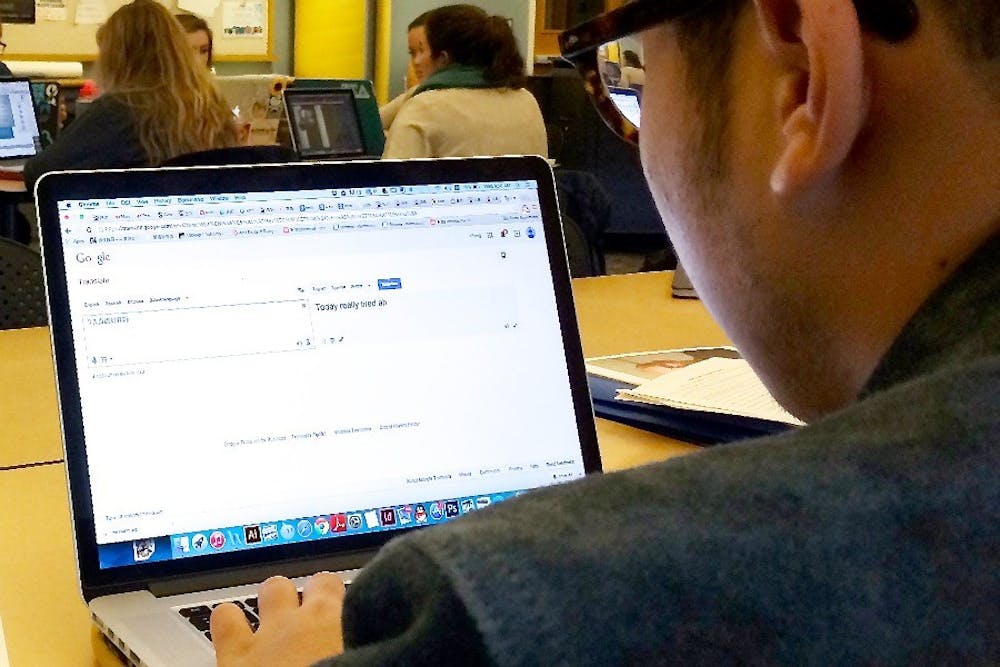Photo by Jalen Walker
By Kaelynn Knestrick, For The Miami Student
Many students use the easily available Google Translate when in a foreign language class. Google Translate may seem like an innocent homework helper, but according to Miami Code of Conduct it can be considered cheating and plagiarism.
According to 1.5.B.2 of the Miami Student Handbook "cheating is using or attempting to use or possessing any aid, information, resources,or means in the completion of an academic assignment that are not explicitly permitted by the instructor or providing such assistance to another student. Plagiarism is presenting as one's own the work, the ideas, the representations or the words of another person/source without proper attribution." Google Translate falls under both these categories because you are using an outside aid to finish an assignment and using words from another source.
"I think of Google Translate as an aid when a teacher isn't there," sophomore Nikolai Levisohn said. "At times it doesn't give you exactly what you need but it can be helpful when there is no other aid. In class your teacher is a human translator, so you should be able to use a translator when you aren't in class."
Google Translate and other such programs can be considered both plagiarism and cheating because the end work is not one's own.
"The work is not your product, and it's not your creative process since the computer is processing the information," French and Italian Professor Gael Montgomery said. "You aren't taking the different elements of language and trying to construct meaning with them. So, you won't learn much, and the professor will know you're a cheater. It's a lose-lose situation."
Surprisingly, teachers are able to tell if a student used a translator more than students may realize.
One way that professors are able to tell if a student uses Google Translate or a similar program is because the translation is more accurate than they expect from students at that level.
"Another indication is that a translator may make mistakes that a person attempting to translate something wouldn't make," Montgomery said. "Translation programs are now fairly sophisticated, but they're not perfect, and they're also not human."
One of the main reasons teachers are able to tell if a students used a translator is because there was vocabulary or sentence structure that was outside the students level of the language, and another is that translators tend to use literal translations.
"I have felt that Google Translate was like a calculator in a math class. It was a tool made available to me and I used it when I couldn't do something on my own. If you know Spanish you should know when it makes an obvious mistake," sophomore Kendall Powell said
Enjoy what you're reading?
Signup for our newsletter
Google Translate may seem like a helpful tool but in some cases it isn't beneficial. Google Translate tends to translate each word individually and literally which can cause sentence structure to be incorrect or the wrong form of a words to be used.
"Online translators tend to use literal translations instead of stating it in the way it would be said in that target language," Spanish Professor Heather Harper said. "For example, in Spanish if you want to say 'I am 20 years old' you would say/write 'Yo tengo veinte años' where the literal English translation is 'I have 20 years'."
There are also worse repercussions to using Google Translate than students would think.
Students can receive a grade of 0 for the assignment or an F for the entire course. The grade received can depend on the type of assignment and the severity and specifics of the case. If the issue goes to an official hearing, students are charged with academic dishonesty/misconduct and a letter goes into their file for the next seven years, Harper said.
The entire assignment does not have to be translated in order to qualify as misconduct; it can be a few words or a single sentence.
"I tend to use Google translate to try and figure out what a question is asking me. I will usually only translate one word to better understand what I am supposed to be doing," Powell said. "I have at times used Google translate to see if what I have written is structurally correct or that I am using the right type of word."
If a student has doubts it is always best to refer to The Student Handbook, as well as consult ones instructor about their specific policies.
"It bears pointing out that at Miami University a charge of academic misconduct does not have to be proved beyond a reasonable doubt," Harper said. "If it is deemed more likely than not that you did use an outside source, then it is considered academic misconduct. For this reason, it is very important that students understand the policies of the department in which the course originates and university wide regulations."
Some of the recent changes made to accommodate the use of online translators, have been adjustments to the rubrics that used to grade many assignments as well as modifications to the format of some assessments. In addition, there have been cases of academic dishonesty/misconduct resulting in hearings in the last few years, Harper said.




